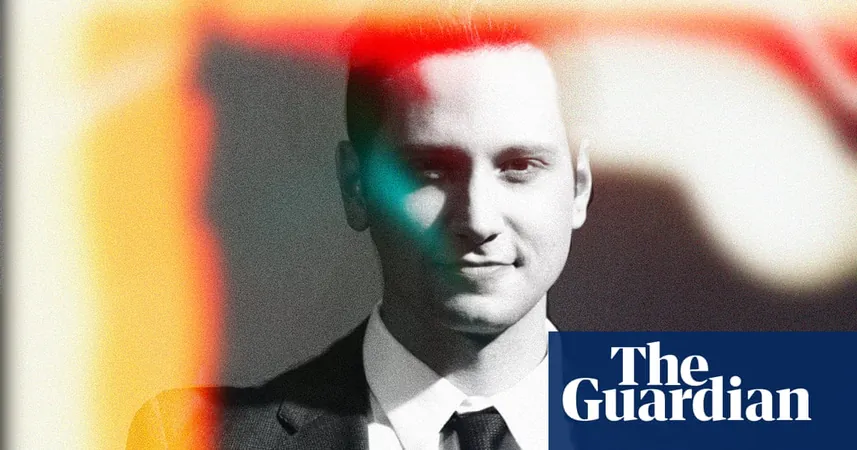
Matt McGorry Opens Up About His Long Covid Battle: A Story of Resilience and Empathy
2024-12-02
Author: Jia
A Vulnerable Revelation
In a vulnerable and candid Instagram video posted on October 28, actor Matt McGorry, famed for his roles in Orange Is the New Black and How to Get Away With Murder, revealed his ongoing struggle with long Covid. Expressing that this was the most intimate issue he had ever shared, McGorry opened up about how two Covid infections have dramatically altered his life.
Impact on Active Lifestyle
Despite his enthusiasm for fitness, McGorry’s once-active lifestyle has been sidelined. He described suffering from symptoms such as chronic fatigue, depression, dysautonomia, Raynaud’s disease, and brain fog—jokingly referring to it as 'a cute little name for brain damage.' This stark shift left him unable to maintain previous hobbies like lifting weights and even reading for pleasure. He reflected, 'Some things that I love that I can’t do anymore are exercising, lifting weights, hiking, and reading an hour a day.'
Advocacy and Empathy
In early November, McGorry encouraged his followers to take Covid precautions seriously, emphasizing the importance of wearing masks in essential spaces. 'Having to still think about Covid fucking sucks. Trust me, I get it,' he stated. However, he insisted that 'empathy alone is not enough without actions of solidarity,' pinpointing the necessity for everyone to help protect vulnerable communities.
The Global Impact of Long Covid
Long Covid has seemingly affected millions globally, with a report indicating that 400 million people are impacted. This condition remains often under-diagnosed and misunderstood, leading McGorry to express his fear of being judged and discriminated against in his career due to his health struggles. Despite these fears, he deemed it critical to raise awareness about long Covid, emphasizing, 'I want able people to learn from disabled people.'
Coming to Terms with Diagnosis
In our interview, McGorry shared deeply about the process of coming to terms with his diagnosis. 'I was in denial about it, because I knew there’s no easy fix,' he admitted, recalling how the grief of losing his father shortly before his first infection exacerbated his feelings of fatigue and confusion. Breaking out of that denial was essential for him to embrace his reality and take control of his health.
Engagement in Social Justice
The conversation about systemic oppression faced by disabled individuals shifted the discussion to how McGorry is actively involved in organizing for anti-racism. 'Those conversations are so different when your own life is impacted,' he said. 'It’s exhausting and often fruitless to convince people that accessibility is a social justice issue.'
Proactive Health Management
The actor described his requirement to stay informed about his condition actively. 'Most of the disabled people I know about long Covid probably read more studies than most doctors,' he said, emphasizing the importance of being proactive in advocating for health concerns. He now keeps a health journal to track his symptoms, medications, and any changes.
Misconceptions about Health
McGorry also addressed the misconceptions about health and effort, revealing how his previous experiences as a personal trainer led him to believe that pushing through discomfort was the key to health. His journey and transformation have led him to consider how societal constructs around fitness and value can detrimentally impact those with chronic illnesses.
Current Risk Mitigation Strategies
As for his current risk mitigation strategies, McGorry stressed the necessity of high-quality masks and Hepa filters to protect himself from further infections. Drawing attention to resources like the Covid Action Map, he highlighted community efforts to make high-quality protective equipment accessible to all. He poignantly summed up the importance of collective effort: 'Even as an act of solidarity, picking a couple of places to wear masks is incredibly important.'
A Call for Solidarity
Through his courageous admissions, McGorry aims to shine a light on the often-ignored plight of long Covid sufferers. He calls on everyone—especially able-bodied individuals—to understand the impact of their choices on those who are vulnerable. As we continue to navigate the pandemic, his story serves as a reminder of the power of empathy and the necessity for solidarity in the face of adversity.

 Brasil (PT)
Brasil (PT)
 Canada (EN)
Canada (EN)
 Chile (ES)
Chile (ES)
 España (ES)
España (ES)
 France (FR)
France (FR)
 Hong Kong (EN)
Hong Kong (EN)
 Italia (IT)
Italia (IT)
 日本 (JA)
日本 (JA)
 Magyarország (HU)
Magyarország (HU)
 Norge (NO)
Norge (NO)
 Polska (PL)
Polska (PL)
 Schweiz (DE)
Schweiz (DE)
 Singapore (EN)
Singapore (EN)
 Sverige (SV)
Sverige (SV)
 Suomi (FI)
Suomi (FI)
 Türkiye (TR)
Türkiye (TR)